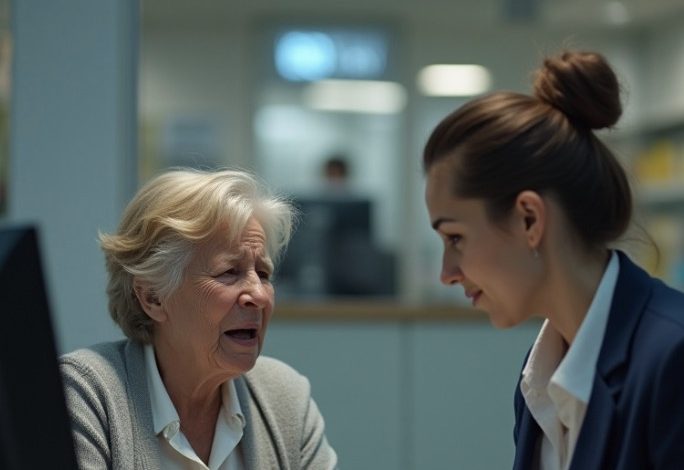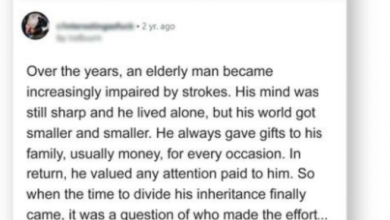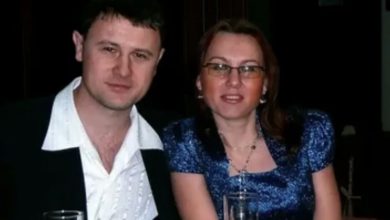The Teller Said, “Your Son Already Withdrew the Money” — But He’d Been with Me All Morning. The Truth Destroyed Me

The lights in First National Bank hummed in that faint, irritating way that always gave me a headache. I’d been coming here every Wednesday for seventeen years, ever since my husband, James, passed away and left me to manage our finances on my own. It had become a routine that gave me comfort — take out a bit of cash, stop by the market, then head home to tend my garden.
But that morning, something felt off the second I stepped through the glass doors.
Emma, the young teller who always smiled at me, looked pale. Her eyes flickered between me and her screen like she was deciding whether or not to say something.
“Good morning, Mrs. Patterson,” she said softly. “How can I help you today?”
“Just my usual,” I replied, sliding my bank card across the counter. “Two hundred dollars, please.”
She typed for a few seconds. Then she froze.
“Is something wrong?” I asked.
Her hands hovered over the keyboard. “I’m… so sorry, Mrs. Patterson. Your account is showing a zero balance.”
I blinked. “That’s impossible. There should be over forty-three thousand dollars in there.”
“Yes, ma’am,” she said quickly, “but there was a full withdrawal this morning — 9:47 a.m.”
My heart started to pound. “I didn’t make any withdrawal this morning. I was home until noon.”
Emma lowered her voice, glancing nervously toward her manager’s office. “The withdrawal was made by your son, Mrs. Patterson. He had a power of attorney authorization.”
The words didn’t make sense. Power of attorney? “That’s not possible,” I said, even though somewhere deep down, I knew it was. “My son Michael was with me all morning. We had breakfast together. He’s been staying with me for two weeks.”
Emma shook her head. “I’m sorry, ma’am. But I processed the transaction myself. It was definitely your son. He had all the right documents.”
The world felt like it was tilting. I thought of Michael at breakfast that morning, sitting across from me, laughing as we looked at old family photos. He’d said he needed to make a phone call, gone downstairs, and I’d heard the front door close. I assumed he’d stepped outside. He came back forty minutes later with a cup of tea, smiling like nothing was wrong.
And now the bank was telling me he’d stolen everything I had.
They showed me the security footage. There he was — my son — smiling at Emma as he handed her papers and signed forms. The timestamp read 9:47 a.m.
“The power of attorney was filed six months ago,” the branch manager explained. “It’s notarized and fully legal. You signed it yourself.”
I remembered then. Michael had come over months ago, telling me he was worried about my health. I’d had a dizzy spell, and he’d insisted I fill out “safety paperwork” so he could help in an emergency. His wife, Jennifer, had been there too, nodding kindly. I’d signed without reading the details — because he was my son.
The drive home felt endless. The closer I got to the house, the heavier the air seemed to grow. When I pulled into the driveway, Michael’s rental car was gone.
Inside, the kitchen was spotless — too spotless. On the oak table where James and I had shared every meal for nearly thirty years, there was only one thing: a single slip of paper with a phone number written in Michael’s neat handwriting.
I called him. Straight to voicemail.
Then I called again. And again.
No answer.
By the fourth try, I was shaking. I left a message. “Michael, it’s Mom. I need you to call me right now. Please.”
When I finally called my daughter, Susan, in Seattle, she sounded irritated, not alarmed.
“Mom, calm down,” she said. “Michael probably moved the money to a safer account. You’ve been a little forgetful lately.”
“I haven’t been forgetful,” I snapped. “He took everything!”
“Mom,” she said gently, “you’ve called me twice this month about the same thing. Maybe you just don’t remember giving him permission.”
My chest felt tight. “Susan, he’s stealing from me.”
“Mom,” she sighed, “Michael’s just trying to help. Don’t make this worse.”
She hung up before I could say another word.
I sat alone in the fading light, staring at the number on the table until it blurred. Then I dialed it.
“Lakewood Legal Services,” a woman’s voice answered.
Moments later, a man came on the line. “Mrs. Patterson. We’ve been expecting your call,” he said smoothly. “Robert Garrison, Michael’s attorney. Your son has moved your funds into a trust for your protection.”
“My protection?” I repeated.
“Yes. There have been concerns about your ability to manage your finances. There’s documentation from your doctor—”
“I don’t have memory problems,” I interrupted.
“Mrs. Patterson, Michael believes it’s in your best interest to transition into assisted living. The paperwork is ready. We just need your signature.”
I felt cold all over. “You can tell my son he’ll never get another signature from me.”
He chuckled softly. “I’m afraid it’s already done, ma’am. Your power of attorney gives him full authority.”
That night, I sat at James’s old desk with a cup of cold coffee and started writing down everything I could remember. Every visit Michael had made. Every conversation. Every withdrawal. By sunrise, I’d filled four pages.
At seven, I called the bank manager, Patricia. She sounded relieved. “Mrs. Patterson, I was hoping you’d call. I’ve been reviewing your transactions, and something’s off. Can you come in right away?”
When I arrived, she led me into her office and shut the door. “What I’m about to tell you,” she said quietly, “could cost me my job. But I’ve known you too long to stay quiet. I believe your son is committing financial abuse.”
She turned her monitor toward me. I saw small withdrawals — $500, $1,000 — spread over several months. “He’s been taking small amounts so you wouldn’t notice,” she explained. “And look at this.” She pulled out a file. “Three days ago, he tried to add his name to your house deed.”
I stared at her. “My house? He’s trying to take my home?”
Patricia nodded. “I refused without your signature, but it’s clear what he’s planning. You need a lawyer.”
She gave me a name: Margaret Parker.
Margaret was younger than I expected — confident, sharp-eyed, no-nonsense. I told her everything. When I finished, she leaned back in her chair.
“Here’s what we’ll do,” she said. “We revoke the power of attorney today. I’ll file it with the court immediately. That stops him from taking anything else. Then, we’ll go after the money.”
By noon, the paperwork was filed. Michael no longer had control.
But at two, he was supposed to come by the house. “Perfect,” Margaret said. “I’ll be there. And I’m bringing a court reporter.”
At exactly 2:33, his car pulled up. Through the window, I watched him get out, straighten his jacket, and check his reflection in the car window. The same son I’d once rocked to sleep now looked like a stranger preparing for battle.
When he walked in and saw Margaret sitting on my sofa, his smile vanished. “Mom, what’s going on? Who’s this?”
“I’m Margaret Parker,” she said calmly. “Your mother’s attorney.”
He glared at her. “This isn’t necessary. Mom, you’ve let someone confuse you. I’ve been protecting you.”
“By stealing forty-three thousand dollars?” Margaret asked.
“I moved it to a trust!” he snapped. “She’s not capable of handling it herself!”
“I’m right here, Michael,” I said quietly. “And I’m perfectly capable.”
He turned to me, his tone softening into fake concern. “Mom, you left the stove on last month. You forgot to pay your bills. You got lost driving home. You’re not safe on your own.”
“Interesting,” Margaret said. “Do you have proof of these claims?”
“I have everything,” he said confidently.
“Good,” she said. “Because as of nine a.m., your power of attorney is revoked. You have zero authority over your mother’s affairs.”
His jaw tightened. “You can’t do that.”
“She already did,” Margaret said, sliding a copy of the revocation across the table. “You have forty-eight hours to return the funds, or we’ll file civil and criminal charges.”
Michael’s mask cracked. “You think you’re clever,” he hissed. “You’re old and lonely, Mom. When this lawyer’s gone, who’s going to help you? Not Susan — she’s on my side.”
I stood, feeling steadier than I had in months. “Get out of my house, Michael.”
He smirked. “The money’s in a trust under Robert Garrison’s name. Completely legal. You want it back? Sue me.” Then he slammed the door behind him.
Minutes later, my phone buzzed — a text from Susan. Michael says you’re accusing him of terrible things. Mom, please stop this before it gets worse.
Before I could reply, an unknown number flashed on the screen. It was Detective Doris Reeves from the sheriff’s office.
“Mrs. Patterson,” she said, “we’ve received a fraud complaint against you from your son.”
I felt the room spin. Margaret took the phone from me. “Detective, this is Margaret Parker, legal counsel. My client is the victim, not the criminal. You need to look into Michael Patterson.”
Within an hour, we were at the station. Michael had filed a guardianship petition claiming I was mentally unfit. But then, a new witness arrived — Jennifer, his estranged wife.
Her hands shook as she handed over a laptop. “He’s been planning this for months,” she said. “There’s proof of everything — forged documents, fake medical letters, even messages to a developer about selling your house.”
Minutes later, a call came in from the fire department. My barn — James’s old barn — was burning. They found a gasoline can nearby. Michael’s fingerprints were on it.
By morning, the police had all the evidence they needed. His journal on the laptop spelled out everything. If I get guardianship, I control everything. It’s the only way to fix my life.
Two weeks later, Michael was arrested trying to board a flight to Mexico. The developers withdrew their offer. The court restored my accounts and officially terminated his power of attorney.
When I got my forty-three thousand dollars back, I didn’t feel joy — only a deep, quiet exhaustion. But I also felt something stronger.
Relief.
Because he hadn’t won.
Three months later, I stood in my garden where the barn used to be, the air cool and golden at sunset. Susan and my granddaughter were visiting.
“I’m sorry, Mom,” Susan said softly.
“I know,” I said. “We’re okay now.”
That night, as I tucked my granddaughter into bed, I realized something.
Michael had tried to steal everything — my money, my house, my dignity. But what he really gave me was proof that I was still strong. Still capable. Still here.
And for the first time in years, I slept peacefully — knowing I had finally taken back my life.










